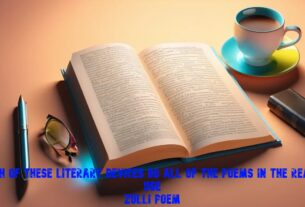Discover the Power of Poetry
Poetry is more than just words on a page—it’s a powerful form of expression that transcends time, culture, and language. From ancient epics to modern spoken word, poetry has the ability to evoke emotions, inspire change, and connect people on a deeper level. In this article, we’ll explore the transformative power of poetry and how it can enrich your life.
What is Poetry?
Poetry is a literary art form that uses rhythmic and metaphorical language to express ideas, emotions, and stories. Unlike prose, which follows a straightforward structure, poetry often relies on imagery, symbolism, and creative wordplay to convey its message.
The Origins of Poetry
Poetry dates back thousands of years, with some of the earliest examples found in ancient civilizations like Mesopotamia, Greece, and India. From Homer’s Iliad to the verses of the Rigveda, poetry has always been a way for humans to document history, share wisdom, and celebrate beauty.

Forms of Poetry
There are countless forms of poetry, each with its own unique structure and style. Some popular forms include:
- Sonnet: A 14-line poem with a specific rhyme scheme (e.g., Shakespearean sonnets).
- Haiku: A Japanese form consisting of three lines with a 5-7-5 syllable pattern.
- Free Verse: Poetry without a fixed structure or rhyme scheme.
- Spoken Word: A performance-based style that emphasizes rhythm and delivery.
The Emotional Power of Poetry
One of the most remarkable aspects of poetry is its ability to evoke deep emotions. Whether it’s joy, sorrow, love, or anger, poetry has a way of touching the heart and soul.
Poetry as Therapy
Many people turn to poetry as a form of emotional release and healing. Writing or reading poetry can help individuals process complex feelings, cope with trauma, and find solace in difficult times. Organizations like the Poetry Therapy Institute even use poetry as a therapeutic tool to support mental health.
Connecting with Others
Poetry also fosters empathy and connection. When we read a poem that resonates with our own experiences, we feel understood and less alone. Similarly, sharing poetry can create bonds between people, allowing them to express emotions that might otherwise be difficult to articulate.
The Intellectual Power of Poetry

Beyond its emotional impact, poetry also stimulates the mind. It challenges us to think critically, interpret meaning, and appreciate the beauty of language.
Enhancing Creativity
Writing poetry encourages creativity and imagination. It pushes us to experiment with words, explore new perspectives, and think outside the box. For many, poetry is a playground for self-expression and innovation.
Improving Language Skills
Reading and writing poetry can also improve language skills. Poets often use rich vocabulary, metaphors, and wordplay, which can expand your understanding of language and enhance your communication abilities.
The Social Power of Poetry
Poetry has long been a tool for social change and activism. Throughout history, poets have used their words to challenge injustice, inspire movements, and give voice to the marginalized.
Poetry as Protest
From Langston Hughes’s powerful verses about racial inequality to Amanda Gorman’s stirring inauguration poem, The Hill We Climb, poetry has been a medium for protest and empowerment. It allows individuals to speak truth to power and rally others around a cause.
Building Communities
Poetry also brings people together. Open mic nights, poetry slams, and writing workshops create spaces for individuals to share their work, connect with others, and celebrate creativity. These communities often serve as safe havens for self-expression and collaboration.
The Spiritual Power of Poetry
For many, poetry is a spiritual experience. It can provide a sense of transcendence, helping individuals connect with something greater than themselves.
Poetry and Mindfulness
Reading or writing poetry can be a form of mindfulness. It encourages us to slow down, reflect, and appreciate the present moment. The rhythmic nature of poetry can also have a calming effect, similar to meditation.
Exploring the Divine
Many poets use their work to explore themes of spirituality, faith, and the divine. From Rumi’s mystical verses to the biblical Psalms, poetry has been a way for humans to express their relationship with the sacred.
How to Harness the Power of Poetry
Whether you’re a seasoned poet or a complete beginner, there are many ways to incorporate poetry into your life and experience its transformative power.
Start Writing
You don’t need to be an expert to write poetry. Start by jotting down your thoughts, feelings, or observations. Experiment with different forms and styles, and don’t be afraid to make mistakes. Remember, poetry is about self-expression, not perfection.
Read Widely
Explore the works of poets from different cultures, time periods, and styles. Reading widely can inspire your own writing and deepen your appreciation for the art form.
Join a Community
Consider joining a poetry group or attending open mic events. Sharing your work with others can be a rewarding experience, and you’ll likely learn from the creativity of those around you.
Use Poetry in Daily Life
Incorporate poetry into your daily routine. Write a poem in your journal, read a poem before bed, or share a favorite verse with a friend. These small acts can bring joy and meaning to your everyday life.
Conclusion
Poetry is a timeless and universal art form that has the power to move, inspire, and transform. Whether you’re reading a classic sonnet, writing a heartfelt verse, or listening to a spoken word performance, poetry offers a unique way to connect with yourself and the world around you. So, take a moment to discover the power of poetry—you might just find that it changes your life.



